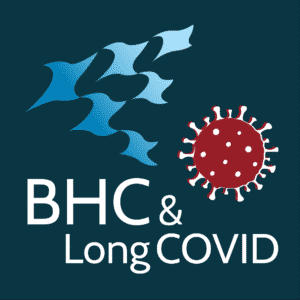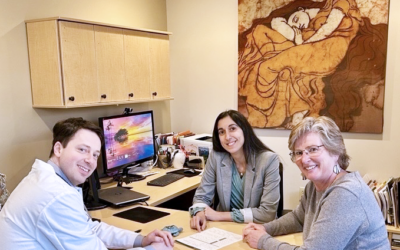COVID-19 has changed our world and at least 10% of those who become ill may have long term effects. These “long haulers” have many similar symptoms to ME/CFS and FM patients. It is critical for BHC to join the assessment, treatment, and education of these patients along with our core work with ME/CFS and FM.
Long COVID is a post-viral illness that can inform research about ME/CFS and FM and may lead to diagnostic biomarkers and effective treatments. As evident in ME/CFS and FM populations, early disease intervention can greatly impact long-term patient outcomes. Early treatment can mitigate decline into long-term chronic illness.
The suffering of Long COVID patients presents a unique and rare opportunity to study the short- and long-term consequences of viral illness. The pandemic has resulted in high public awareness and a commitment of federal funding that we never thought possible for post-viral syndromes. The knowledge BHC gains by studying and treating Long COVID will improve our ability to inform medical providers about management of post-viral syndromes, ME/CFS and FM, and thus achieve our mission of training medical providers to recognize the entire illness spectrum.
BHC’s commitment to drive research, improve clinical care, and transform health education on behalf of people with ME/CFS and FM remains unwavering. It is because of this commitment that we are beginning to evaluate and treat a limited number of Long COVID patients in our clinic. BHC has hired two clinical providers and three medical assistants to make this possible.
Our plan is for these new providers to become ME/CFS and FM experts as well. We also intend to enroll a cohort of Long COVID subjects alongside ME/CFS and Healthy Controls in our NIH-funded research protocols as funding becomes available. In addition, BHC research staff are enrolling interested subjects who have had COVID-19 in our longstanding biomarker discovery protocol. This IRB-approved study allows us to collect information and samples to collaborate with other scientists.
Now is a time to be cautiously optimistic that access to care will gradually become possible for all suffering with ME/CFS, FM and related conditions.




 Lucinda Bateman, MD, is a renowned clinician, researcher, and educator. Her Johns Hopkins University Medical School training instilled an approach to care that she has employed throughout her career - the patient comes first and the unknown or unexplained does not equate to a lack of proper and compassionate care. Since starting her own practice in 2000, she has served on six boards or committees, been the principal investigator for 45 studies, authored/coauthored 40 journal articles, served as adjunct instructor and adjunct assistant professor in the University of Utah Departments of Preventative Medicine, Internal Medicine, and Anesthesiology, and lectured around the world.
Lucinda Bateman, MD, is a renowned clinician, researcher, and educator. Her Johns Hopkins University Medical School training instilled an approach to care that she has employed throughout her career - the patient comes first and the unknown or unexplained does not equate to a lack of proper and compassionate care. Since starting her own practice in 2000, she has served on six boards or committees, been the principal investigator for 45 studies, authored/coauthored 40 journal articles, served as adjunct instructor and adjunct assistant professor in the University of Utah Departments of Preventative Medicine, Internal Medicine, and Anesthesiology, and lectured around the world.